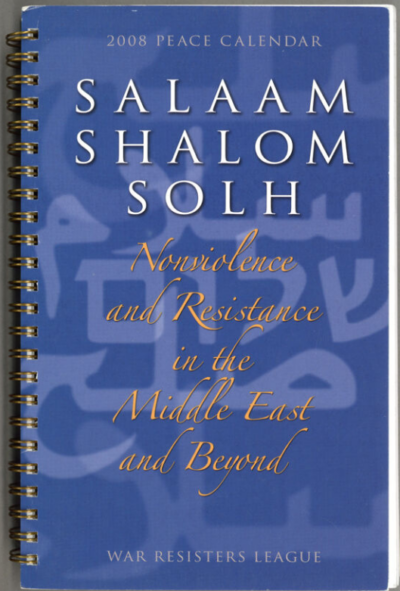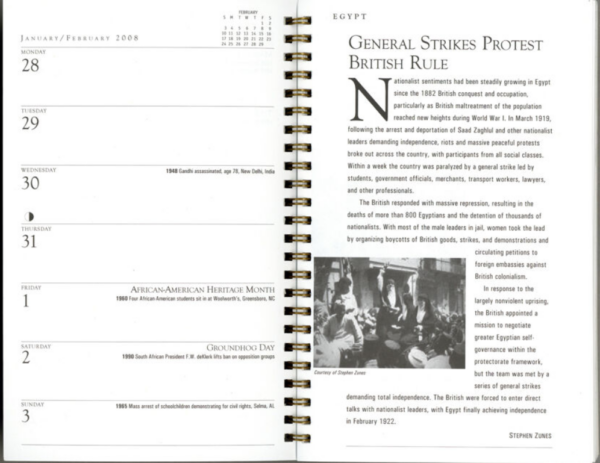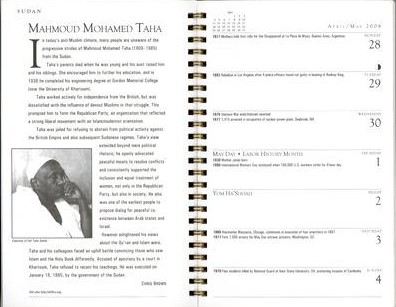Salaam Shalom Solh: 2008 WRL Calendar Stories Remain Exemplary Even After 16 Years
The 2008 War Resisters League calendar, Salaam, Shalom, Solh: Nonviolence and Resistance in the Middle East and Beyond stands out for me as one of the most substantial pieces of activist literature that I’ve helped to create. More than an event program or handout, I had to compile enough stories for 52 weekly entries.

The calendar provides a snapshot of grassroots, nonviolent organizing in the region in the mid-2000’s. Some of the stories were already historical at the time. After sixteen years, a number of the people and organizations included in the 2008 calendar are no longer alive or functioning. That people and groups don’t last forever shouldn’t dissuade us from taking hope and a sense of shared humanity from the stories. In the intervening years, myriad cases could be included, if one were to do an update. Revolution is a process.
Stephen Zunes, University of San Francisco professor of Middle East history and politics, provided important stories and made this important point in his enduring afterword: “With the United States pouring billions of dollars’ worth of sophisticated armaments into the region, bombing and occupying Middle Eastern nations and providing repressive governments and occupying armies with military and economic aid, it is a travesty to allow our fellow Americans to continue to blame the militarism and authoritarianism of the greater Middle East on cultural or religious factors.”
I hadn’t even heard of Western Sahara (the Sahrawi Arab Democratic Republic) until I asked Stephen for help. His entries about the 1922 Egyptian general strike that ended British rule there, student activism in Kuwait, the overthrow of the Shah of Iran, and the Druze of the Golan Heights showed me how much I didn’t yet know.

I was able to find many brave individuals who deserve to be lifted up: Mahmoud Mohamed Taha of Sudan; Atham Naisse, a Syrian human rights defender; Malalai Joya, a brave, young Afghan woman elected to parliament; and Mohammad Ali El Husseini, a Lebanese Shia cleric who advocated a nonviolent response to the 2006 Israeli invasion. And the touching stories of anonymous people my friends met during peace delegations, while providing protective accompaniment or even as a captive, like Jim Loney’s story about his Iraqi captor’s decision not to become a suicide bomber.

The stories from places like Pakistan, Yemen, and Iran humanize the people in places that many people in the United States couldn’t even locate on a map. There are stories about conscientious objectors in Eritrea, Israel, Iraq, Turkey, and elsewhere. There are stories of women organizing in places like Afghanistan, Palestine/Israel, Egypt, and Iraq.
There are entries devoted to peace teachings from each of the Abrahamic faiths. A few of the stories are about older history like Egypt’s general strikes and women’s leadership against British rule which led to independence in 1922.
Rereading the calendar’s introduction sixteen years down the road, I was pleased essentially to stand by what I wrote at the time. I originally had been thinking about a “52 Palestinian Gandhis” calendar to rebut the tiresome, ignorant refrain I heard too often, even in progressive, pacifist communities: “If only there were a Palestinian Gandhi.” In the intervening years, I have met so many such Palestinians, that global ignorance about them is a tragic credit to Israeli influence on western media.
Some of the efforts in Palestine with Israelis remain operative and vital. Others of them I now view as somewhat limited in their approach. The problems are more contemporary and political than ancient and religious, so I’m less moved by stories of religious friendship and cooperation than I used to be. They remain valid and important though, like the Jerusalem Peacemakers and the Abrahamic Reunion. I’m used to progressives joining together across religious lines as we fight against ethno-nationalists who unfortunately are also banding together against progressive movements, and it is important not to promote false equivalencies.The calendar wouldn’t have been as readable without editorial help from Judith Pasternak and design by Rick Bickhart. Kathy Kelly, courageous founder of Voices for Creative Nonviolence (née, Voices in the Wilderness), was gracious to write the introduction and point me to the importance of sharing people’s stories and amplifying their voices.
The calendar wouldn’t have been as readable without editorial help from Judith Pasternak and design by Rick Bickhart. Kathy Kelly, courageous founder of Voices for Creative Nonviolence (née, Voices in the Wilderness), was gracious to write the introduction and point me to the importance of sharing people’s stories and amplifying their voices.
I am especially grateful to WRL for making me aware of peacemaker stories. The 1984 WRL Peace Calendar about World War II conscientious objectors left a lasting impression on me. The calendar is relevant today so we feel connected to a global lineage of peaceworkers. There are like-minded people struggling wherever there is conflict, and we must strive to support them. I hope this little volume continues to bring lesser-known stories to people’s attention and that it helps to counter the tide of ignorance that fuels settler colonialism and its racist dehumanization and genocide.
– Jim Haber, May 21, 2024
Jim Haber is a long-time activist with many affiliations including Jewish Voice For Peace, the Center for Jewish Nonviolence, the National War Tax Resistance Coordinating Committee, The War Resisters League, and the Catholic Worker Movement. He is a maintenance tech for a network of mental health/substance abuse, residential treatment programs. Jim also leads imaginative and refreshing exercise classes, mostly for seniors. His website is laughingjim.com, and his blog, Approximately Monthly Missives, is at haberjim.wordpress.com.
Share



